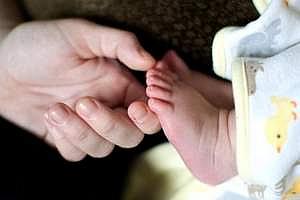Prescription for Tragedy | Funds for infant withdrawal syndrome are scarce
Laura Ungar wrote these stories for The Courier-Journal as a 2012 National Health Journalism Fellow. Other stories in this series include:
Defeated by drugs, Kentucky man takes his own life
Native spirituality helps some cope
Former soccer mom turned addict helping other women
How Lines for Life helps out the addicted 24/7
Oregon's success in treating addicts is a lesson for Kentucky
Recovery Kentucky centers use a supportive program in which the clients hold one another accountable
Treatment options for tackling addiction can vary from hours to months
Addicts overwhelm Kentucky's drug treatment options
Waiting-list names haunt woman at The Healing Place in Louisville

With the numbers of addicted babies skyrocketing, Kentucky and hospital officials say they’ve made it a priority to help the infants and try to stem the growing problem.
“This is driving costs in so many areas up from a fiscal standpoint,” said Audrey Tayse Haynes, secretary of the Kentucky Cabinet for Health and Family Services. “Then you look at the children who are born withdrawing from drugs — that’s a whole different cost. That’s the human cost.”
More on the series: Read continuing coverage of the prescription drug epidemic in Kentucky
Cabinet officials met with medical professionals this month to discuss ways to combat the crisis.
“We’re just at the early stages of trying to put together all the experts in the field,” Haynes said. “It’s going to take all the knowledge of everybody to deal with this problem.”
There’s no way to measure exactly how much the state spends on the addicted newborns because its budgets aren’t broken down that way. But state and federal governments have put more money into some programs designed to help vulnerable families:
• In April, Gov. Steve Beshear announced that Independence House Recovery Kentucky Center in Corbin received a $262,500 Community Development Block Grant from the federal government to support recovery care for residents. The 15-bed center serves pregnant and post-partum women battling substance abuse. Residents can stay 40 days to 12 months.
• Van Ingram, executive director of the state Office of Drug Control Policy, is seeking a $45,000 grant from the National Governors Association to educate medical providers and the public about drug abuse and infants.
• A new Medicaid benefit means the state and federal governments will spend more money treating drug abuse in coming years. The current state behavioral health department budget for substance abuse treatment and prevention is about $34 million.
The Medicaid budget for the current two-year period includes funds to cover substance abuse services such as individual therapy, group therapy, peer support and intensive case management for 5,800 people.
This “i-waiver” program is funded through a state general fund increase to the Department for Medicaid Services — $1.7 million in 2012-13 and $4.4 million in fiscal 2013-14. Along with associated federal funds, this means total funding of $5.8 million in 2012-13 and $14.9 million in 2013-14 for these services.
But as the state struggles in the rocky economy, not every program designed to help pregnant women give birth to healthy babies is getting more money.
KIDS NOW Plus, a state initiative targeting pregnant women at risk of substance abuse, won’t see its $1.4 million budget grow next year despite the fact that officials say it works.
In fiscal 2011, KIDS NOW provided prevention services to 1,443 pregnant women, and case management and outreach to 551. Overall, officials said, the program has reduced the number of clients misusing prescription drugs during pregnancy and six weeks post-partum by 75 percent.
When the problem can’t be prevented, hospitals are increasingly taking steps to meet addicted infants’ needs.
Plans for the new Norton Women’s Hospital and Kosair Children’s Hospital-St. Matthews call for a 10-bed neonatal abstinence syndrome center of excellence.
And a task force at University Hospital developed a neonatal abstinence syndrome protocol so doctors and nurses treat the problem uniformly, based on the best medical evidence.
The protocol, put in place in 2005 and revised this year, includes guidelines for assessing babies, managing their medicine, nursing and comfort care, and discharging infants.
Karen Kelly, president of the Eastern Kentucky anti-drug organization Operation UNITE, recently observed a similar program at East Tennessee Children’s Hospital in Knoxville.
Besides a treatment protocol, the Tennessee hospital uses volunteer cuddlers, has put together an educational brochure on the dangers of taking drugs during pregnancy and sends neonatal intensive care unit representatives to speak with community groups.
As policymakers and advocates attack the problem on a large scale, doctors and nurses continue the daily struggle to help individual babies.
But they agree they can do only so much; a lot depends on the child’s home environment and whether their mothers stay off drugs.
Pauline Hayes, clinical nurse manager for University Hospital’s neonatal intensive care unit, said nurses must remind themselves when addicted newborns leave the hospital, “it’s not our baby; it’s their baby, and we have to get them ready to take their baby home.”
This article was originally published in http://www.courier-journal.com

